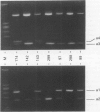Abstract
We report a family with the Li-Fraumeni syndrome (LFS) in whom we have been unable to detect a mutation in the coding sequence of the p53 gene. Analysis of linkage to three polymorphic markers within p53 enabled direct involvement of p53 to be excluded. This is the first example of a LFS family in whom exclusion of p53 has been possible. Four affected members of the family with sarcoma or premenopausal breast cancer showed increased expression of p53 protein in their normal tissues as detected by immunohistochemistry. It therefore appears that the LFS phenotype has been conferred by an aberrant gene, showing a dominant pattern of inheritance, which may be acting to compromise normal p53 function rather than by a mutation in p53 itself. In order to try to determine the chromosomal location of this putative gene, we have carried out studies of linkage to candidate loci. By these means we have excluded involvement of Rb1 and BRCA1 on chromosomes 13q and 17q respectively. The MDM2 oncogene on chromosome 12q was considered to be the prime candidate as MDM2 is amplified in sarcomas and the MDM2 product binds to p53. Furthermore, p53 mutation and amplification of MDM2 have been shown to be mutually exclusive events in tumour development. Linkage analysis to two polymorphic markers within MDM2 yielded a three-point LOD score of -5.4 at a recombination fraction theta equal to zero. Therefore MDM2 could be excluded. It is possible that the gene which is responsible for cancer susceptibility in this family, possibly via interaction with p53, will be important in the histogenesis of breast cancer in general. We are now carrying out further studies to locate and identify this gene.
Full text
PDF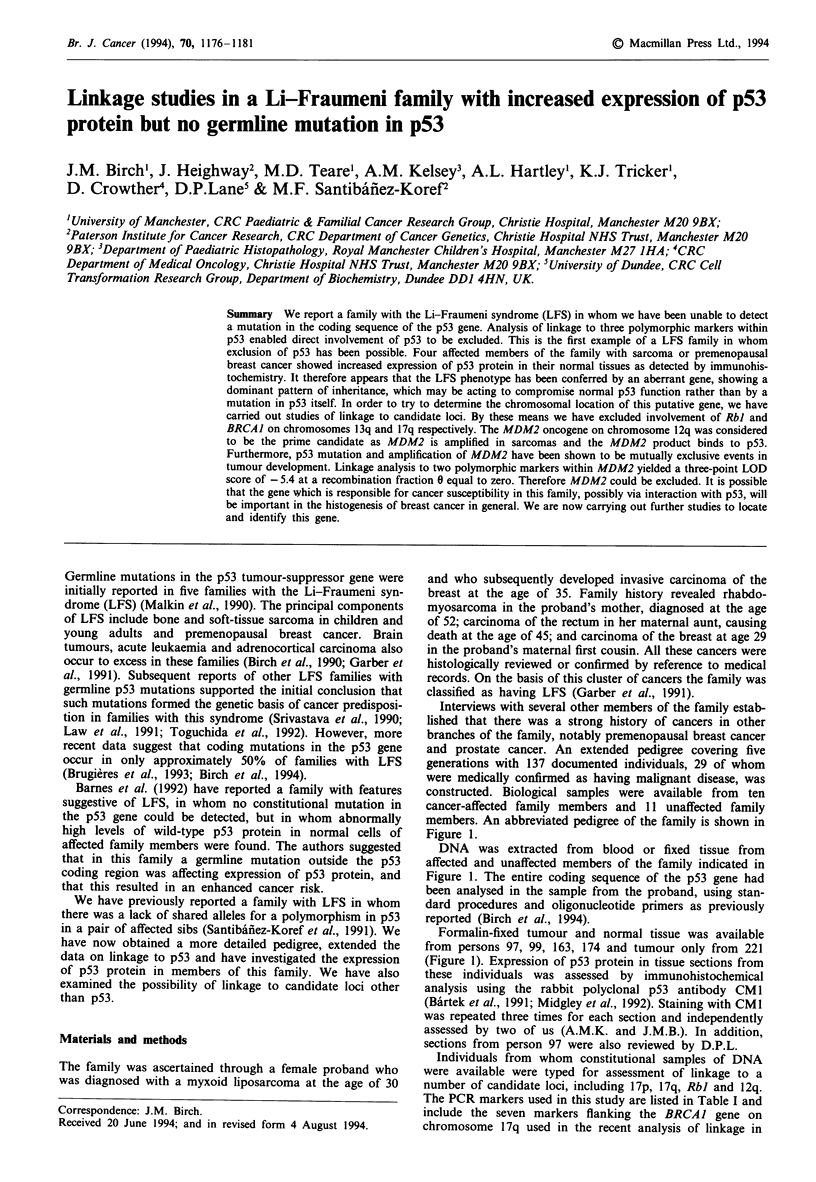
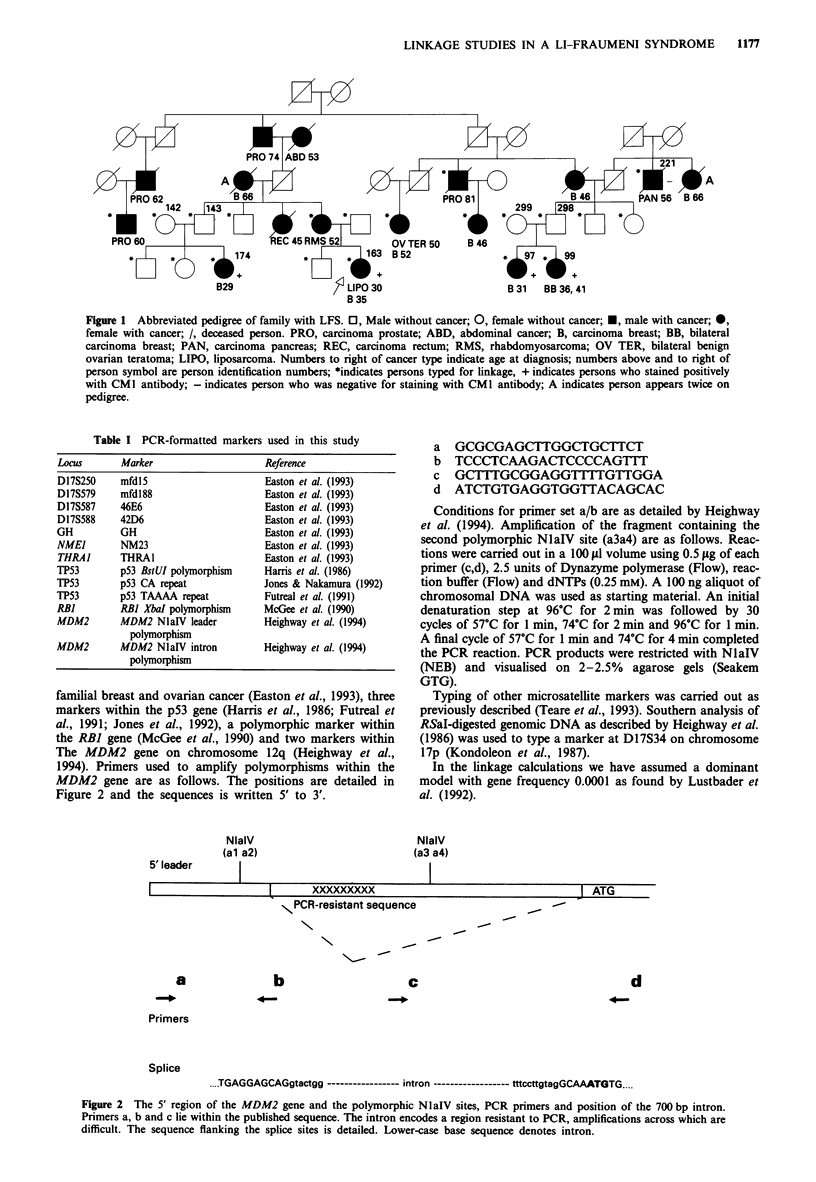
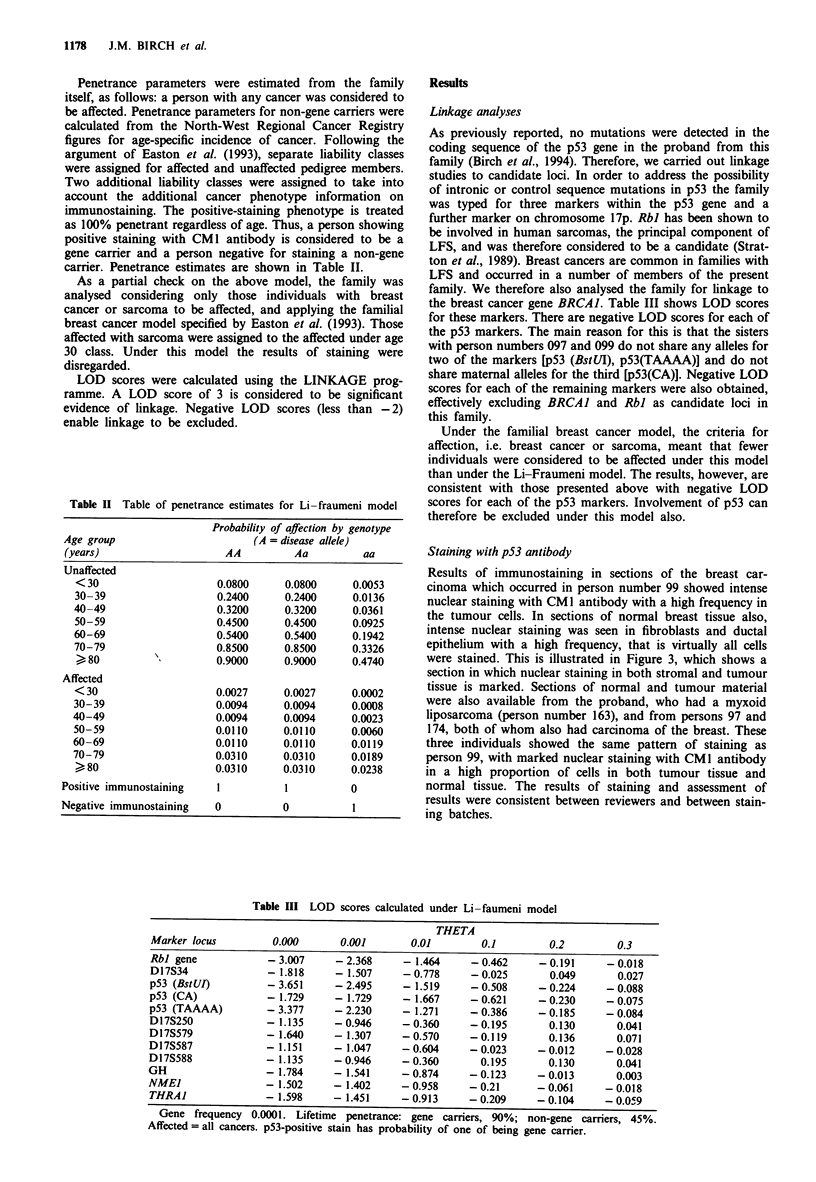
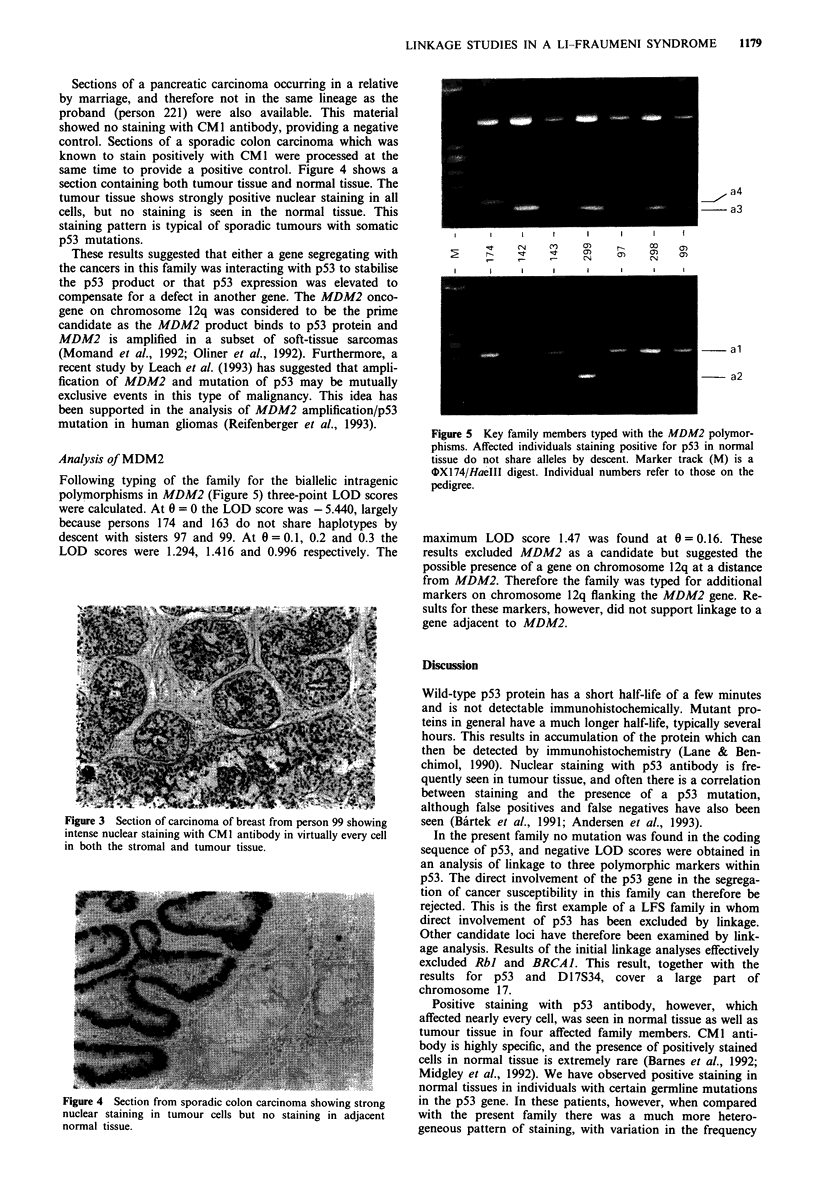
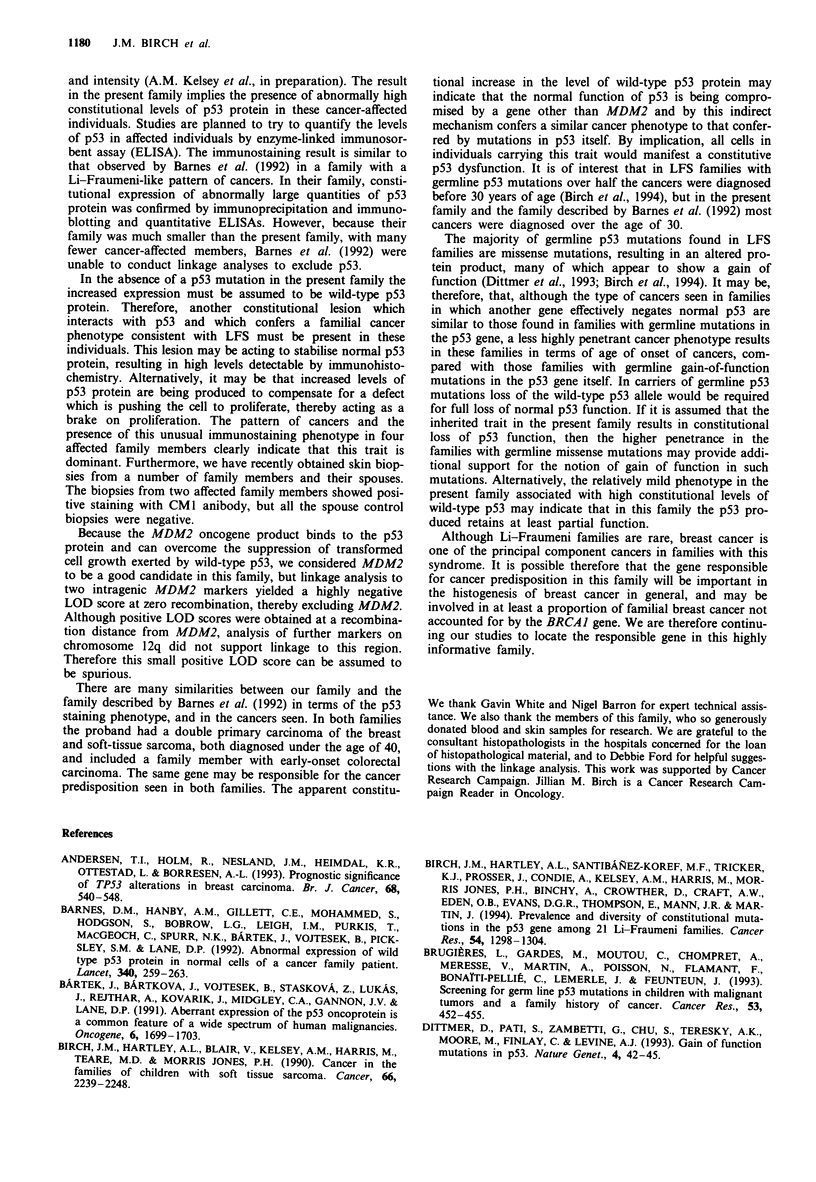
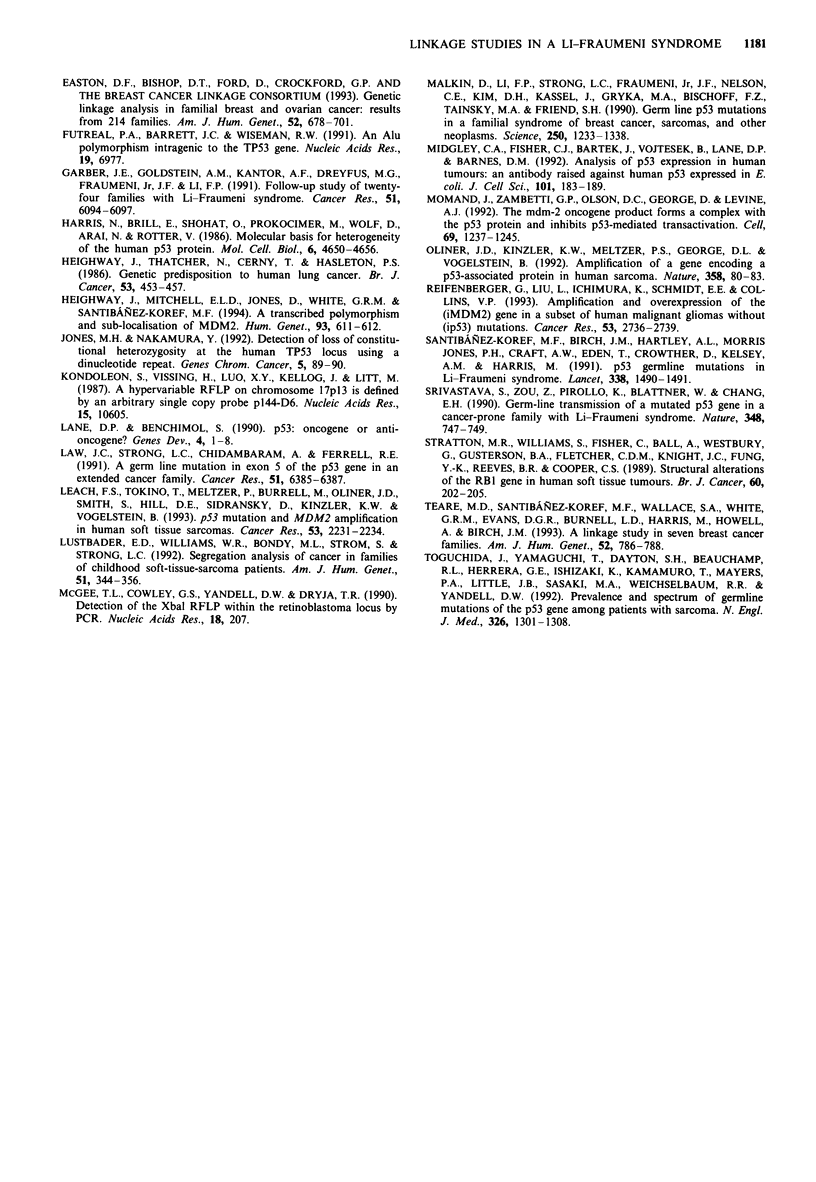
Images in this article
Selected References
These references are in PubMed. This may not be the complete list of references from this article.
- Andersen T. I., Holm R., Nesland J. M., Heimdal K. R., Ottestad L., Børresen A. L. Prognostic significance of TP53 alterations in breast carcinoma. Br J Cancer. 1993 Sep;68(3):540–548. doi: 10.1038/bjc.1993.383. [DOI] [PMC free article] [PubMed] [Google Scholar]
- Barnes D. M., Hanby A. M., Gillett C. E., Mohammed S., Hodgson S., Bobrow L. G., Leigh I. M., Purkis T., MacGeoch C., Spurr N. K. Abnormal expression of wild type p53 protein in normal cells of a cancer family patient. Lancet. 1992 Aug 1;340(8814):259–263. doi: 10.1016/0140-6736(92)92354-i. [DOI] [PubMed] [Google Scholar]
- Birch J. M., Hartley A. L., Blair V., Kelsey A. M., Harris M., Teare M. D., Jones P. H. Cancer in the families of children with soft tissue sarcoma. Cancer. 1990 Nov 15;66(10):2239–2248. doi: 10.1002/1097-0142(19901115)66:10<2239::aid-cncr2820661034>3.0.co;2-q. [DOI] [PubMed] [Google Scholar]
- Birch J. M., Hartley A. L., Tricker K. J., Prosser J., Condie A., Kelsey A. M., Harris M., Jones P. H., Binchy A., Crowther D. Prevalence and diversity of constitutional mutations in the p53 gene among 21 Li-Fraumeni families. Cancer Res. 1994 Mar 1;54(5):1298–1304. [PubMed] [Google Scholar]
- Brugières L., Gardes M., Moutou C., Chompret A., Meresse V., Martin A., Poisson N., Flamant F., Bonaïti-Pellié C., Lemerle J. Screening for germ line p53 mutations in children with malignant tumors and a family history of cancer. Cancer Res. 1993 Feb 1;53(3):452–455. [PubMed] [Google Scholar]
- Bártek J., Bártková J., Vojtesek B., Stasková Z., Lukás J., Rejthar A., Kovarík J., Midgley C. A., Gannon J. V., Lane D. P. Aberrant expression of the p53 oncoprotein is a common feature of a wide spectrum of human malignancies. Oncogene. 1991 Sep;6(9):1699–1703. [PubMed] [Google Scholar]
- Dittmer D., Pati S., Zambetti G., Chu S., Teresky A. K., Moore M., Finlay C., Levine A. J. Gain of function mutations in p53. Nat Genet. 1993 May;4(1):42–46. doi: 10.1038/ng0593-42. [DOI] [PubMed] [Google Scholar]
- Easton D. F., Bishop D. T., Ford D., Crockford G. P. Genetic linkage analysis in familial breast and ovarian cancer: results from 214 families. The Breast Cancer Linkage Consortium. Am J Hum Genet. 1993 Apr;52(4):678–701. [PMC free article] [PubMed] [Google Scholar]
- Futreal P. A., Barrett J. C., Wiseman R. W. An Alu polymorphism intragenic to the TP53 gene. Nucleic Acids Res. 1991 Dec 25;19(24):6977–6977. doi: 10.1093/nar/19.24.6977. [DOI] [PMC free article] [PubMed] [Google Scholar]
- Garber J. E., Goldstein A. M., Kantor A. F., Dreyfus M. G., Fraumeni J. F., Jr, Li F. P. Follow-up study of twenty-four families with Li-Fraumeni syndrome. Cancer Res. 1991 Nov 15;51(22):6094–6097. [PubMed] [Google Scholar]
- Harris N., Brill E., Shohat O., Prokocimer M., Wolf D., Arai N., Rotter V. Molecular basis for heterogeneity of the human p53 protein. Mol Cell Biol. 1986 Dec;6(12):4650–4656. doi: 10.1128/mcb.6.12.4650. [DOI] [PMC free article] [PubMed] [Google Scholar]
- Heighway J., Mitchell E. L., Jones D., White G. R., Santibáez Koref M. F. A transcribed polymorphism and sub-localisation of MDM2. Hum Genet. 1994 May;93(5):611–612. doi: 10.1007/BF00202837. [DOI] [PubMed] [Google Scholar]
- Heighway J., Thatcher N., Cerny T., Hasleton P. S. Genetic predisposition to human lung cancer. Br J Cancer. 1986 Apr;53(4):453–457. doi: 10.1038/bjc.1986.72. [DOI] [PMC free article] [PubMed] [Google Scholar]
- Jones M. H., Nakamura Y. Detection of loss of heterozygosity at the human TP53 locus using a dinucleotide repeat polymorphism. Genes Chromosomes Cancer. 1992 Jul;5(1):89–90. doi: 10.1002/gcc.2870050113. [DOI] [PubMed] [Google Scholar]
- Kondoleon S., Vissing H., Luo X. Y., Magenis R. E., Kellogg J., Litt M. A hypervariable RFLP on chromosome 17p13 is defined by an arbitrary single copy probe p144-D6 [HGM9 No. D17S34]. Nucleic Acids Res. 1987 Dec 23;15(24):10605–10605. doi: 10.1093/nar/15.24.10605. [DOI] [PMC free article] [PubMed] [Google Scholar]
- Law J. C., Strong L. C., Chidambaram A., Ferrell R. E. A germ line mutation in exon 5 of the p53 gene in an extended cancer family. Cancer Res. 1991 Dec 1;51(23 Pt 1):6385–6387. [PubMed] [Google Scholar]
- Leach F. S., Tokino T., Meltzer P., Burrell M., Oliner J. D., Smith S., Hill D. E., Sidransky D., Kinzler K. W., Vogelstein B. p53 Mutation and MDM2 amplification in human soft tissue sarcomas. Cancer Res. 1993 May 15;53(10 Suppl):2231–2234. [PubMed] [Google Scholar]
- Lustbader E. D., Williams W. R., Bondy M. L., Strom S., Strong L. C. Segregation analysis of cancer in families of childhood soft-tissue-sarcoma patients. Am J Hum Genet. 1992 Aug;51(2):344–356. [PMC free article] [PubMed] [Google Scholar]
- Malkin D., Li F. P., Strong L. C., Fraumeni J. F., Jr, Nelson C. E., Kim D. H., Kassel J., Gryka M. A., Bischoff F. Z., Tainsky M. A. Germ line p53 mutations in a familial syndrome of breast cancer, sarcomas, and other neoplasms. Science. 1990 Nov 30;250(4985):1233–1238. doi: 10.1126/science.1978757. [DOI] [PubMed] [Google Scholar]
- McGee T. L., Cowley G. S., Yandell D. W., Dryja T. P. Detection of the XbaI RFLP within the retinoblastoma locus by PCR. Nucleic Acids Res. 1990 Jan 11;18(1):207–207. doi: 10.1093/nar/18.1.207-a. [DOI] [PMC free article] [PubMed] [Google Scholar]
- Midgley C. A., Fisher C. J., Bártek J., Vojtesek B., Lane D., Barnes D. M. Analysis of p53 expression in human tumours: an antibody raised against human p53 expressed in Escherichia coli. J Cell Sci. 1992 Jan;101(Pt 1):183–189. doi: 10.1242/jcs.101.1.183. [DOI] [PubMed] [Google Scholar]
- Momand J., Zambetti G. P., Olson D. C., George D., Levine A. J. The mdm-2 oncogene product forms a complex with the p53 protein and inhibits p53-mediated transactivation. Cell. 1992 Jun 26;69(7):1237–1245. doi: 10.1016/0092-8674(92)90644-r. [DOI] [PubMed] [Google Scholar]
- Oliner J. D., Kinzler K. W., Meltzer P. S., George D. L., Vogelstein B. Amplification of a gene encoding a p53-associated protein in human sarcomas. Nature. 1992 Jul 2;358(6381):80–83. doi: 10.1038/358080a0. [DOI] [PubMed] [Google Scholar]
- Reifenberger G., Liu L., Ichimura K., Schmidt E. E., Collins V. P. Amplification and overexpression of the MDM2 gene in a subset of human malignant gliomas without p53 mutations. Cancer Res. 1993 Jun 15;53(12):2736–2739. [PubMed] [Google Scholar]
- Santibáez-Koref M. F., Birch J. M., Hartley A. L., Jones P. H., Craft A. W., Eden T., Crowther D., Kelsey A. M., Harris M. p53 germline mutations in Li-Fraumeni syndrome. Lancet. 1991 Dec 14;338(8781):1490–1491. doi: 10.1016/0140-6736(91)92303-j. [DOI] [PubMed] [Google Scholar]
- Srivastava S., Zou Z. Q., Pirollo K., Blattner W., Chang E. H. Germ-line transmission of a mutated p53 gene in a cancer-prone family with Li-Fraumeni syndrome. Nature. 1990 Dec 20;348(6303):747–749. doi: 10.1038/348747a0. [DOI] [PubMed] [Google Scholar]
- Stratton M. R., Williams S., Fisher C., Ball A., Westbury G., Gusterson B. A., Fletcher C. D., Knight J. C., Fung Y. K., Reeves B. R. Structural alterations of the RB1 gene in human soft tissue tumours. Br J Cancer. 1989 Aug;60(2):202–205. doi: 10.1038/bjc.1989.251. [DOI] [PMC free article] [PubMed] [Google Scholar]
- Teare M. D., Santibáez-Koref M. F., Wallace S. A., White G. R., Evans D. G., Burnell L. D., Harris M., Howell A., Birch J. M. A linkage study in seven breast cancer families. Am J Hum Genet. 1993 Apr;52(4):786–788. [PMC free article] [PubMed] [Google Scholar]
- Toguchida J., Yamaguchi T., Dayton S. H., Beauchamp R. L., Herrera G. E., Ishizaki K., Yamamuro T., Meyers P. A., Little J. B., Sasaki M. S. Prevalence and spectrum of germline mutations of the p53 gene among patients with sarcoma. N Engl J Med. 1992 May 14;326(20):1301–1308. doi: 10.1056/NEJM199205143262001. [DOI] [PubMed] [Google Scholar]






